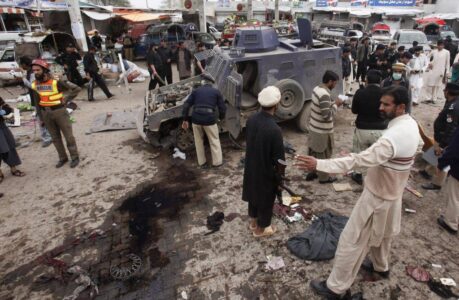
Taliban terrorist group shows it can launch terror attacks anywhere across Afghanistan
The gruesome image showed two dozen corpses in military uniforms, dragged into a tangled line on a hard empty plain. Their clothes were smeared with dirt, their faces wrapped in bloody rags.
The photo, circulating widely on social media here, was reportedly taken in far western Nimruz province, where military officials said Taliban attackers killed more than 20 soldiers Thursday evening.
But it could have been almost anywhere in Afghanistan.
In the past several weeks, Taliban fighters have staged ground attacks and bombings in 24 of Afghanistan’s 34 provinces, leaving scores dead. In northeastern Takhar they ambushed and killed at least 40 soldiers and police. In northwestern Ghowr, a car bomb killed 19 civilians. In southern Helmand, Taliban fighters are still clashing with Afghan forces after a two-week assault on the provincial capital region.
The message of the surge is clear and coldblooded. Even as Taliban delegates continue to nominally participate in peace talks with Afghan leaders in Qatar, the insurgents have shown no intention of reducing violence. Instead, they appear out to prove they can wreak havoc everywhere.
In the past week alone, Afghan security officials said Saturday that the Taliban had staged 356 attacks, two suicide bombings and 52 mine explosions across the country, killing 51 civilians and wounding 157. They said more than 400 insurgents were killed but did not give casualty figures for Afghan forces. A suicide bombing in Kabul Saturday, which killed at least 24 students, was claimed by the Islamic State group, a rival extremist organization.
As the violence spreads, Afghans have expressed outrage, and several prominent Middle Eastern religious scholars have condemned the attacks, especially against civilians, as un-Islamic. But Taliban leaders, partly in response to the criticism, reiterated that they have the right to kill anyone connected with the Afghan government or its foreign backers.
“All troops and workers serving the Kabul administration have waged war against Muslims for the past 20 years. They are a bunch of criminals and mercenaries,” Zabiullah Mujahid, the chief Taliban spokesman, said in an interview published Saturday on a Taliban website. “As long as they do not repent and accept an Islamic system, they shall continue to be killed,” and those who kill them will be “rewarded immensely by God.”
Mujahid said his group had two long-term missions: “to force out foreign fighters” and to “reestablish an Islamic government.” Now that the United States has agreed to withdraw all its troops, he said, the second goal of waging “jihad” against the current government in Kabul is “mandatory.”
The spokesman made no mention of the peace talks, but Taliban delegates there have refused to recognize the U.S.-backed Afghan government’s legitimacy to negotiate, calling it an infidel foreign puppet. The delegation from Kabul includes a broad cross-section of prominent Afghans, all of them Muslim.
“We see no sense of urgency by the Taliban about ending this war,” one delegate to the talks said Saturday, speaking on the condition of anonymity because the group members have agreed not to air their views. “They are not listening to anyone. They are just killing time and killing people.”
In interviews Saturday, officials in five provinces where recent attacks have occurred expressed deepening worry about the new insurgent reach and the possible failure of the talks in Qatar.
Mohammad Mahdavi, a provincial council member in Ghowr, said the Taliban now controls or influences 90 percent of the province. The bombing last week in the capital, which also wounded 150 people, was not claimed by the Taliban, but Mahdavi said it was clear Taliban fighters were behind it.
“People here are in shock,” he said. “They have lost hope in the government.” He said the Taliban now controls most of the region’s highways, taxing goods on trucks and extorting passengers. “They can impose an economic embargo any time they want,” he said. “Now people fear it will get worse.”
In Nimruz, a relatively quiet province that borders both Iran and Pakistan, Gul Ahmad Noorzad, a legislator, said local security forces had been weakened by high-level corruption while soldiers are “being martyred every day. The morale is very low and nobody cares about them.”
The recent Taliban attacks in Nimruz have been unprecedented. In the past week, 12 police officers and a police chief were killed by a roadside bomb, 23 soldiers died when the Taliban attacked an army base, and seven policemen guarding a dam were killed by insurgent fighters near the provincial capital.
Source: Washington Post





